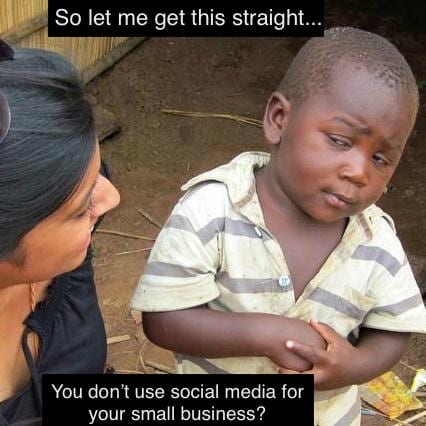Your brand reputation is much more than answering a few Google reviews here and there. From the words you use in your copy to the logo you use, your brand reputation is everything, and once it’s tarnished, it’s hard to get it nice and shiny again.
If you’re wondering how your business can build and maintain its brand reputation online, here are eight handy suggestions to consider.
1. Build your brand identity and establish an online presence
Brand identity
First and foremost, you need to solidify your brand identity before building your reputation. Your brand identity entails bringing all your brand elements together to convey a cohesive look and story to the public. Investing in a style guide is the best way to generate consistency across all areas of your branding.
Studies show that consistent brand identity across all channels has increased revenue by 33%. This increase in revenue is due to the ability of the public to recognise your brand with ease, meaning that they will recall your brand over time.
To learn more about building your brand, read our blog: Baffled by Branding, Brand Strategy and Brand Identity? Let us Break it Down For You!
Social media
Once you’ve established your brand identity, it’s time to ensure you’re set up on social media. Establishing a social media presence is crucial for success, and many small businesses miss out on potential customers – especially if their target audience is Generation Z or Millennials.
While we’re not telling you to download every social platform under the sun, it’s worth choosing one or two you can pay close attention to and use to complement your brand identity. The platforms that work best for your business might not even be the ‘mainstream’ platforms, so be sure to research your audience and find what social media sites they frequent.
For a breakdown of social media sites, read our blog, How Each Social Media Platform Can Benefit Your Business.
2. Be proactive – ask for reviews
While you have some creative control over the brand you portray to your audience, you must also manage your brand’s external online presence. Regardless of business size, there are plenty of people who can have a lot to say about what you do. Unfortunately, some negative reviews can come with the positive ones. Not everyone is going to like what you do!
Reviews are a crucial part of business success, with 98% of Australians reading online reviews before making a purchase and 94% of them believing these reviews to be trustworthy.
However, a more important statistic for business owners is that 56% of people surveyed only left a review online because a seller had prompted them to.
Yes, we know it can be uncomfortable to ask your customers to leave a review, but it is vital in building a solid brand reputation. You can Google templates for how to ask your customers for reviews, but we believe personalisation and simplicity are key and can lead to better results!
3. Don’t forget to respond to your reviews
Creating a strategy to monitor business reviews will ensure you’re not missing any. Reviews can appear on various sites, including Google My Business, Yelp, TripAdvisor and Facebook.
Now that you’ve asked your customers for their feedback, it’s important that you reply to each review you receive – especially the negative ones. If you address them quickly and strategically, there’s a good chance you can turn a poor customer service experience around.
Although negative reviews can feel a little soul-crushing, there are some important things to remember when responding.
- Respond quickly – this allows you to get on the front foot and manage your reputation before any more fuel is added to the fire.
- Keep it professional – when you own your own business, there’s a good chance you’ve put your heart and soul into it. When responding to negative reviews, it’s crucial to keep your tone professional and don’t allow yourself to get carried away by emotions. Flaring tempers and the urge to argue are things you need to keep out of your response!
- Keep it public if possible – Although it might feel more personal to email or phone an unhappy customer to discuss their concerns, it doesn’t show others how you manage complaints. You might have a great phone call with someone who has left a negative review, but if you don’t respond publicly, people may assume you’re ignoring them. A lot of complaints are easily resolved by a good old-fashioned phone call but don’t forget to respond online to the original review so that your audience know you have addressed the issue.
4. Listen to what your audience is telling you
One of the best things you can do to strengthen your brand reputation is to learn and grow from customer feedback.
Many brands have lost customers to their competitors because they refuse to adapt and make accommodations for their consumers. While you’re never going to please everyone, you still need to listen to what your audience is saying.
If you notice a pattern in the feedback and reviews you’re getting, consider if this is something you can control and amend. For example, if you find that an increasing number of people complaining about how long postage is taking, see if there is another postage company that can deliver orders faster.
Learning and growing from feedback is a great way to humanise your brand and enhance your reputation.
5. Ensure you have top-notch customer service
High-quality customer service goes hand in hand with consumer feedback. In fact, nearly 80% of customers tell more people about a negative experience than a positive one. Word of mouth is a powerful marketing tool, and one businesses often overlook.
When you revisit the fact that the vast majority (92%) of consumers believe and trust recommendations from friends and family as well as online reviews. All it takes is for one easily avoided customer experience for customers to boycott your business for another one.
By improving your customer service online, over the phone, across social channels and in person and having a solid conflict resolution process in place, you can quickly and effectively rectify and prevent negative customer experiences.
6. Honesty is the best policy
We know the truth can hurt. However, customers can sense dishonesty from a mile away. People hate fine prints and hidden fees that can leave them feeling blindsided.
Extra fees suck, but not knowing about them upfront sucks more. The same goes for product orders. For example, imagine you’ve launched a new product and set up a pre-order due for delivery to your customers on a specific date. You get a phone call from your supplier telling you there has been a delay in your order production, meaning this will push back the date of when your customers receive it. Instead of hoping for a miracle, get on the front foot and update everyone who ordered that their order will be delayed. Better still, if you can, consider offering something as an ‘apology’ such as free shipping or a discount on their next order.
Your customers appreciate honesty and transparency, so you can build your brand reputation by always keeping all lines of communication open.
7. Practice what you preach
This one stems from the above point. Staying true to the brand story you’re telling is crucial. Whether you’re creating a new product, implementing a new service, or even hiring a new team member, consider the following questions:
- Is this move something that feels like ‘us’?
- Does our current strategy still represent who we are?
- Does this new venture align with what we stand for?
- Are we staying true to our values if we make this shift?
For example, if your company values sustainability and works toward greener practices, choosing an energy company that heavily pollutes the environment (just because it may be cheaper) isn’t the best move.
Besides, people are pretty good investigators nowadays, so your chance of exposure is alarmingly high and can cause your reputation a world of pain.
8. Invest in influencer marketing
Lastly, influencer marketing can positively or negatively influence (no pun intended) your brand reputation. It’s no secret that influencer marketing is a significant priority for businesses. From celebrity partnerships to those with large followings, people want to buy things recommended by others. In fact, almost 50% of consumers have purchased something because of an influencer.
By associating your brand with a trustworthy influencer, you’re growing your brand’s reputation and expanding your reach. However, instead of signing on the latest batch of MAFS contestants as your new influencers, find someone who aligns with your brand values.
To learn more about influencer marketing, read our blog: Influencers: How and Why? Are They Right for Your Biz?
While influencers can boost your brand credibility, these must be managed closely. One of the most relevant examples that have dominated the media recently is the partnership between Adidas and Ye (formerly known as Kanye West). Ye was dropped as an Adidas ambassador late last year following Ye’s antisemitic comments on social media and in interviews. Despite parting ways, investors in the company have now filed a class-action lawsuit against Adidas over its partnership with Ye and the alleged failure to disclose business risks.
Your brand reputation must constantly be monitored to ensure your customers have a favourable view of your business. Businesses with solid brand reputations that deal with customers in a personable but transparent way have a much better chance of generating sales than businesses with poor reputations.
If your business wants to implement a reputation management strategy, contact the Oraco team via email or Instagram DM.



